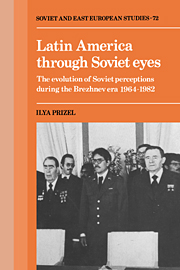 Latin America through Soviet Eyes
Latin America through Soviet Eyes Book contents
- Frontmatter
- Contents
- Preface
- Acknowledgments
- Introduction
- Part I Soviet perceptions of Latin America's global role
- Part II Soviet perceptions of Latin American social structures
- Part III Soviet–Latin American relations during the Brezhnev era
- Part IV Conclusion: the emerging Soviet perception of Latin America and the future of Soviet policy toward the hemisphere
- Conclusions
- Epilogue – Latin America: the Long March
- Notes
- Bibliography
- Index
- Frontmatter
- Contents
- Preface
- Acknowledgments
- Introduction
- Part I Soviet perceptions of Latin America's global role
- Part II Soviet perceptions of Latin American social structures
- Part III Soviet–Latin American relations during the Brezhnev era
- Part IV Conclusion: the emerging Soviet perception of Latin America and the future of Soviet policy toward the hemisphere
- Conclusions
- Epilogue – Latin America: the Long March
- Notes
- Bibliography
- Index
Summary
This study evaluates the evolution of Soviet perceptions of, and attitudes toward, Latin America during the Brezhnev period (1964–1982). The Brezhnev era is especially significant because it was during this period that the USSR rose from being a regional world power to a global power able to exert its influence throughout the world. I look at three major components of Soviet perceptions: the changing Soviet perception of Latin America's domestic politics; the new role of Latin America in the international arena and the ability of the United States to influence regional events; and emerging Soviet–Latin American relations.
The purposes of this study are to clarify the data base the Soviets use to formulate their policy toward Latin America and to see whether greater interaction has resulted in a more sophisticated and subtle Soviet approach. I examine and discuss how the various changes that took place in Latin America, the United States, and the Soviet Union altered Moscow's perceptions of Latin America's internal and external structure and, thus, of the region's international posture. In addition, I look at how these altered perceptions influenced the USSR's policy toward the hemisphere, and I explore whether, by the end of the Brezhnev era, Soviet political and academic communities were emerging with a new model and prognosis for the future political course of Latin America.
- Type
- Chapter
- Information
- Latin America through Soviet EyesThe Evolution of Soviet Perceptions during the Brezhnev Era 1964–1982, pp. ix - xiiPublisher: Cambridge University PressPrint publication year: 1990
